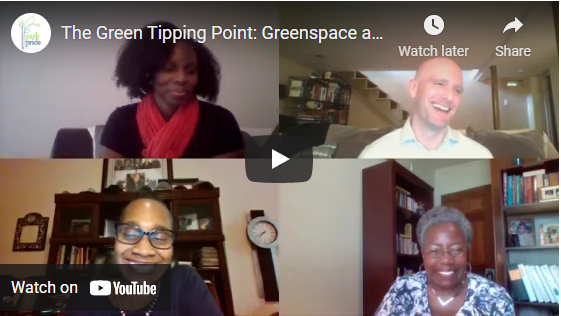By now it has become common knowledge that efforts to improve community green space often lead to gentrification and displacement of local residents. A recent article - “Green Gentrification and Health: A Scoping Review,” published in January 2021 in the International Journal of Environmental Research and Public Health - co-authored by Dr. Na’Taki Osborne Jelks, Co-founder of West Atlanta Watershed Alliance, Faculty at Spelman College, and Member of RCE Greater Atlanta - examines 15 studies on the health effects of greening initiatives in gentrifying neighborhoods. The abstract summarizes the findings: “Overall, longtime, marginalized residents are negatively impacted by green gentrification as they experience a lower sense of community, feel that they do not belong in green space, and, in many studies, use green space less often than newcomers. Overall, the research in this area is limited, and more studies on mental health and cardiovascular health markers could advance this literature. Based on the limited available evidence, we suggest that public health, urban planning, and parks professionals could collaborate to enhance the use of green space for marginalized residents and their feelings of inclusion in gentrifying areas.”
Inspired by this literature review, a handful of RCE Greater Atlanta members, including myself, Na’Taki Osborne Jelks, Cicely Garrett, and Nancy Larson, are taking the authors up on their call to take collaborative action. Together, as part of two RCE Greater Atlanta Action Groups – Advancing Justice for All and Business Engagement - we have launched an effort to explore how our multi-stakeholder sustainability network can support community-driven efforts not only to prevent and repair the negative effects of green gentrification, but also to use green space improvements to enhance quality of life for legacy residents and contribute to the development of complete, thriving neighborhoods where residents can age in place.
RCE Greater Atlanta is a United Nations-affiliated regional sustainability network that supports multi-stakeholder implementation of the U.N. Sustainable Development Goals through education and training. It is one of over 175 Regional Centres of Expertise on Education for Sustainable Development around the world. We want to figure out: given our purpose, structure, and members, what are the particular ways in which RCE Greater Atlanta is positioned to advance equity in this important area?
Our first effort to start this conversation - aimed at determining our role in this work and then figuring out an action plan – was to host an interactive online session at Park Pride’s 20th Annual Parks and Greenspace Conference, held on May 4th, 2021, called “The Green Tipping Point: Greenspace as a Catalyst for Community Preservation & Prosperity.” Moderated by social entrepreneur Cicely Garrett, the session featured Na’Taki Osborne Jelks talking about her research, and then featured Ms. Ola Reynolds, Chairperson, NPU-G and Member, Westside Park Equitable Development Task Force, who shared how these issues are playing out in real time in Atlanta through the development of Atlanta’s Westside Park. We then opened up the conversation to participants to share their perspectives. The spirited session engaged over 70 participants from a broad range of neighborhoods, organizations, and sectors. Importantly, it elevated the voices of Westside community members. It also fostered additional connections and follow-up among participants to continue the conversation and led to an initial list of people interested in being involved in next steps.
The session is available online here: https://youtu.be/9J7lBFMbhYY. If you are interested in being invited to the next follow-up conversation, please email Jenny Hirsch and we’ll put you on the list: jennifer.hirsch@gatech.edu.
